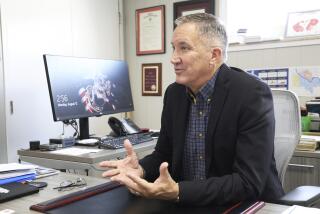Soviets Allow Bible Study Classes in Some Latvian State Schools
- Share via
MOSCOW — Bible study classes, conducted by a Protestant pastor, are being organized in some state high schools in Riga, the capital of the Soviet Baltic republic of Latvia, in the latest demonstration of the increasing government tolerance of religion.
The lessons, which are not compulsory, were introduced at the request of parents and students, the official Soviet news agency Tass reported Saturday from Riga, and include the history of religion and a comparison of world religions.
Students, most of whom are at least 16 years old, have reportedly packed the classes, which are taught by Pastor Viestur Pirro of St. Gertrude’s Church in Riga. Lutheranism is the predominant religion among Latvians.
Gunvald Zlamiec, the principal at one of the schools, said that although he was an atheist himself, “I am convinced that the Bible, as a monument of human thought, must be studied.
“In the Bible are the sources of culture, of ethics and of morality,” Zlamiec told Tass. “Several generations have grown up in ignorance of the fact, for example, that biblical subjects inspired painters, writers and poets to create great works of art and literature. Bible study is also a path towards understanding man and his spiritual search.”
The lessons are a startling departure from past Soviet policy, which prohibited religious instruction of all types outside a person’s immediate family.
For decades, priests and ministers of all religions in the Soviet Union have been barred from activities outside their churches, and many have been jailed for seeking to teach religion to young people.
New grass-roots political movements in the Baltic republics of Estonia, Latvia and Lithuania, which were all forcefully incorporated into the Soviet Union in 1940, have made full religious freedom a major political demand.
But the Bible study course in the Riga schools follows government steps to increase religious freedom.
President Mikhail S. Gorbachev, speaking to leaders of the Russian Orthodox Church last spring before their celebration of the 1,000th anniversary of Christianity here and then to Communist Party leaders at a special conference in June, stressed freedom of religious belief, equal rights of believers and the government’s desire to cooperate with the churches in many social and cultural matters.
In Riga and Vilnius, the capital of neighboring Lithuania, the government recently returned to church authorities local cathedrals that were seized in anti-church campaigns in the 1950s.
More to Read
Sign up for Essential California
The most important California stories and recommendations in your inbox every morning.
You may occasionally receive promotional content from the Los Angeles Times.












